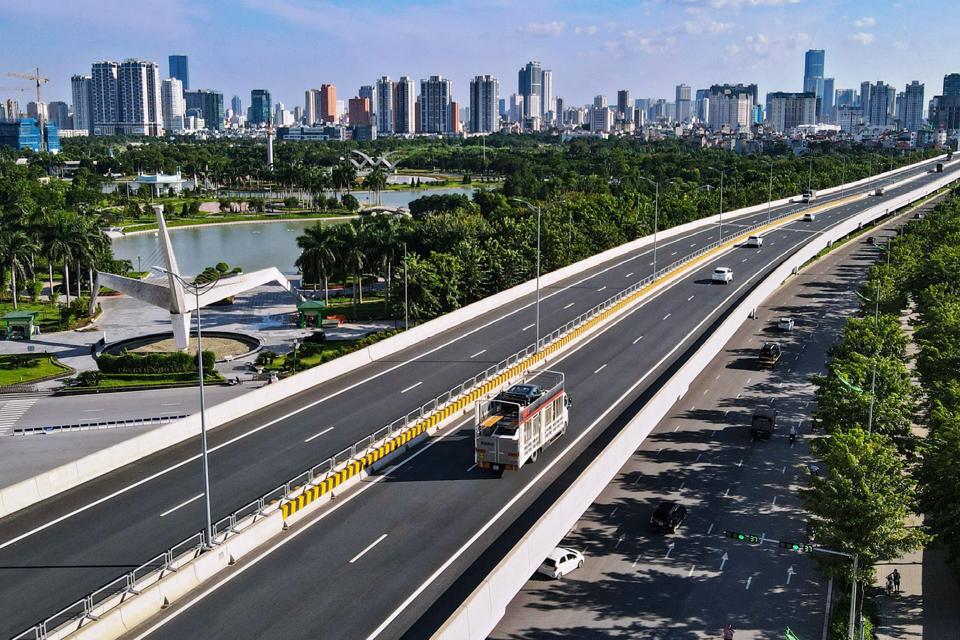Ring road projects significant for long-term growth in Vietnam’s major cities
Lack of connectivity has long been seen as a hindrance to development. Succeeding in tackling the issue would take Vietnam to a booming period.
Ring road projects, including the No.3 in Ho Chi Minh City and No.4 in the Hanoi capital area, are expected to play a key role in creating new growth engines for the major cities in Vietnam.
| New ring road projects would further aid economic development. Photo: Hong Quy |
Experts shared the view during an online conference discussing the necessity to boost inter-provincial linkage, making them a breakthrough for development on May 4.
Vice-Chairman of the Hanoi People’s Committee Duong Duc Tuan noted that ring road No.4, which connects 14 districts from three northern cities/provinces including Hanoi, Hung Yen, and Bac Ninh, would benefit the entire capital area and the Northern lowland regions.
“The construction of this ring road would open up new spaces for socio-economic development while creating another economic and inter-provincial transport corridor,” he added.
In addition to connecting with the Noi Bai International Airport, Tuan said Hanoi would build another airport in the southeast of the city under its upcoming overall planning.
In the city’s south, the ring road No.4 is set to connect with the North-South express railway.
“The expansion of the ring road No.4 would allow Hanoi to revise its overall planning and create a new growth engine for urban and rural development,” Tuan said.
Sharing Tuan’s view, Economist Tran Dinh Thien said the presence of two ring roads in Hanoi and Ho Chi Minh City would have significant impacts on Vietnam’s two largest cities.
“They would support the development of industrial corridors in these two cities to soon reach Southeast Asia and international levels,” Thien said.
“Transport and logistics services are also among the beneficiaries,” he said, envisioning the formation of high-standard urban areas.
Thien stressed the long-term vision of the connectivity between ring roads and airports would help Vietnam seize better opportunities from global access to aid the recovery process.
“Lack of connectivity has long been seen as a hindrance to development. Succeeding in tackling the issue would take Vietnam to a booming period,” Thien stressed.
While the advantages of the two ring roads project for both Hanoi and Ho Chi Minh City are obvious, the key priority would be to soon put these plans into reality.
Duong Ba Duc, Deputy Director of the Department of Investment under the Ministry of Finance, noted site clearance is essential for these projects.
“A smooth site clearance process would help ensure the project going as planned,” Duc said, noting the pressure would be on local authorities to reach an agreement for resettlement packages with affected households.
Another key aspect mentioned by Duc is the huge investment capital for these projects, for which he expected it would take up to three years to finalize the investment procedures.
Director of the Ho Chi Minh City Transport Department Tran Quang Lam said the ring road No.3 in Ho Chi Minh City would cost VND75.4 trillion (US$3.28 billion), 81% of which are set to be disbursed in the 2020-2025 period.
Lam said the city is working with other provinces in preparing for the construction of the project to ensure its completion by 2026.
For the ring road No.4 in the Hanoi capital area, Vice Chairman Duong Duc Tuan said the financing method would be a combination of public investment and public-private partnership (PPP).
“Under calculation, the project’s investment could be recouped in 21 years,” Tuan said, adding it has received great interest from investors.
“Throughout the process of searching for PPP investors, the city would also look at strategic partners to develop rural areas,” he added.
Covering an area of more than 24,000 square kilometers and an estimated population of 22 million, the capital area, with Hanoi as the core city, includes the provinces of Vinh Phuc, Hung Yen, Bac Ninh, Hai Duong, Ha Nam, Hoa Binh, Bac Giang, Phu Tho, and Thai Nguyen. In its latest proposal to the Government, Hanoi’s authorities estimated the cost of the ring road No.4 project at VND85.8 trillion (US$3.73 billion), down VND8.7 trillion ($381 million) from the previous estimate in January. Under the proposal, Hanoi suggested that Ring road No.4 have a total length of 112.8 kilometers, including 103.1-kilometer of the ring road and 9.7 kilometers of an access road in the direction of the Noi Bai – Ha Long expressway. The project, set to cover an area of 1,341 hectares, would be divided into seven sub-components and carried out under the combination of private-public partnership (PPP) and public investment mechanisms. |












